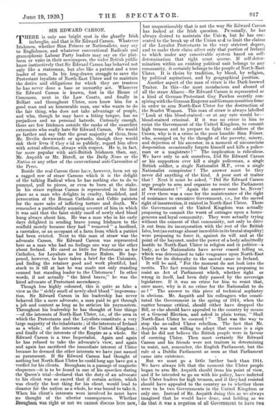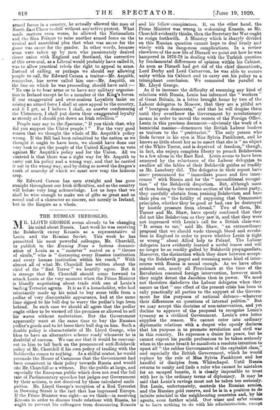SIR EDWARD CARSON. T HERE is only one bright spot in
the ghastly Irish imbroglio, and that is Sir Edward Carson. Whatever Irishmen, whether Sinn Feiners or Nationalists, may say to Englishmen, and whatever conventional Radicals and gramophonic Labour Party leaders may say on the plat- form or write in their newspapers, the wider British public know instinctively that Sir Edward Carson has behaved not only like a statesman, but also like a patriot and a true leader of men. In his long-drawn struggle to save the Protestant loyalists of North-East Ulster and to maintain the duties and obligations for which they are trustees he has never done a base or unworthy act. Wherever Sir Edward Carson is known, first in the House of Commons, next in the Law Courts, and finally in Belfast and throughout Ulster, men know him for a good man and an honourable man, one who wants to do the fair thing, who does not take advantage of people, and who, though he may have a biting tongue, has no prejudices and no personal hatreds. Curiously enough, there are few Irishmen outside the ranks of the anarchist extremists who really hate Sir Edward Carson. We would go farther and say that the great majority of them, from Mr. Devlin downwards or upwards, though they would risk their lives if they aid so publicly, regard him often with actual affection, always with respect. He is, in fact, far more popular with anti-British Irishmen than, say, Mr. Asquith or Mr. Birrell, or the Daily News or the Nation or any other of the conventional anti-Carsonites of the Press.
Beside the real Carson there have, however, been set up a ragged row of straw Carsons which it is the delight of the talking Radical when he has nothing else to do to pummel, pull to pieces, or even to burn at the stake. In his straw replicas Carson is represented in the first place as a man who delights in cruelty, bloodshed, and persecution of the Roman Catholics and Celtic patriots for the mere sake of inflicting torture and death. We remember a particularly amusing account of him in which it was said that the faint sickly smell of newly shed blood hung always about him. He was a man who in his early days delighted in sending brave young Irishmen to the scaffold merely because they had " removed " a landlord, a caretaker, or an occupant of a farm from which a patriot had been evicted. Next to this man of straw was the advocate Carson. Sir Edward Carson was represented here as a man who had no feelings one way or the other about Ireland. He cared as little for Protestants as for Catholics, for Loyalists as for Home Rulers. He hap- pened, however, to have taken a brief for the Unionists, and finding the retainer good and work plentiful, had stuck to it till at last he was made not only standing counsel but standing leader to the Ulstermen ! In other words, if not actually " the hired bravo," he was the hired advocate of Protestant ascendancy.
Though leas highly coloured, this is quite as false a view as the " sickly smell of newly-shed blood " impersona- tion. Sir EdWard Carson in his leadership has never behaved like a mere advocate, a man paid to get through a job and content as long as he satisfies his paymasters. Throughout his leadership he has thought of four things —of the interests of North-East Ulster, i.e., of the area in which the Protestants and the Loyalists constitute a very large majority of the inhabitants ; of the interests of Ireland as a whole ; of the interests of the United Kingdom ; and finally of the interests of the Empire as a whole. Sir Edward Carson is a true Imperialist. Again and again he has refused to take the advocate's view, and again and again has sacrificed the immediate interest of Ulster because he deemed the other interests we have just named as paramount. If Sir Edward Carson had thought of nothing but North-East Ulster he could long ago have got a verdict for his clients. Brougham in a passage of magnetic eloquence—it is to be found in one of his speeches during the Queen's trial—declared that the duty of an advocate to his client was so sacred that if certain action, which was clearly the best thing for his client, would lead to disaster for the nation as a whole, he was bound to take it. When his client's interests were involved he must have no thought of the ulterior consequences. Whether Brougham was right or not we cannot discuss here now, but unquestionably that is not the way Sir Edward Carson has looked at the Irish question. Pe-sonally, he has always desired to maintain the Unicn, but he has con- sented to the break up of the Union and to limit the claims of the Loyalist Protestants in the very strictest degree, and to make their claim affect only that portion of Ireland to which under any conceivable system based on self- determination that right must accrue. If self-deter- mination within an existing political unit belongs to any community, it certainly belongs to the people of North-East Ulster. It is theirs by tradition, by blood, by religion, by political aspirations, and by geographical position. Another aspect of the man of straw is the Dark-browed Traitor. In this—the most mendacious and absurd of all the straw Aliases—Sir Edward Carson is represented as a kind of German-Protestant Guy Fawkes secretly con- spiring with the German Emperor and German munition firms in order to arm North-East Ulster for the destruction of the Scarlet Woman. This man of straw is always labelled " I,00k at this blood-stained--or at any rate would be- blood-stained criminal. If it was no crime in him to resist the Government of the United Kingdom, to commit high treason and to prepare to fight the soldiers of the Crown, why is it a crime in the poor humble Sinn Feiner, who, scourged on by the thought of the poverty, misery, and dejection of his ancestor, in a moment of unconscious desperation occasionally forgets himself and kills a police- man or a magistrate ? " The implication is ridiculous. We have only to ask ourselves, Did Sir Edward Carson or his supporters ever kill a single policeman, a single British soldier, a single Nationalist M.P., even a single Nationalist conspirator ? The answer must be they never did anything of the kind. A poor sort of traitor that ! Next it must be asked, " Did Sir Edward Carson urge people to arm and organize to resist the Parliament at Westminster ? " Again the answer must be, Never If ever there was a case for the maintenance of the right of resistance to executive Government, i.e., for the sacred right of insurrection, it existed in North-East Ulster. There the Government of the United Kingdom was actually proposing to commit the worst of outrages upon a homo- geneous and loyal community. They were actually trying without the consent of that community, not only to drive it out from its incorporation with the rest of the British Isles, but (an outrage almost incredible in its brutal stupidity) were proposing to force it, against its will and at the point of the bayonet, under the power of a body admittedly hostile to North-East Ulster in religion and in politics—a body, as the Nationalists have never ceased telling us, which was determined to take vengeance upon North-East Ulster for its disloyalty to the sacred cause in Ireland. It will be said, For the moment do not look into the merits. The fact remains that Carson was proposing to resist an Act of Parliament which, whether right or wrong in itself, had been duly passed by the sovereign legislature. If it was no crime for him to resist that, once more, why is it no crime for the Nationalist to do so ? " The answer to this piece of technical sophistry is obvious. Mr. Asquith and his colleagues who consti- tuted the Government in the spring of 1914, when the matter became critical, should either have dropped the Bill, or else should have appealed to the country by means of a General Election, and asked in plain terms, " Shall North-East Ulster be coerced ? " That was the way to stop the so-called Ulster rebellion. The fact that Mr. Asquith was not willing to adopt that means is a sign that he did not believe the British people were in favour of coercing Ulster. Then most certainly Sir Edward Carson and his friends were not traitors in determining to resist, not, remember, the English Parliament, but the rule of a Dublin Parliament as soon as that Parliament came into existence.
But we must go a little 'further back than 1914. We have always felt that the moment the Ulster people began to arm Mr. Asquith shmild from his point of view, and if he intended to go on with his policy, have indicted the Ulster leaders for high treason, and if they had resisted should have appealed to the country as to whether there were to be two Governments in the United Kingdom or only one. Instead of Mr. Asquith doing this as we always imagined that he would have done, and holding as we do that it was a negation of all Government to have two armed forces in a country, he actually allowed the men of North-East Ulster to drill without any active protest. What made matters even worse, he allowed the Nationalists and the Sinn Feiners to raise another armed force on the cynical and anarchical plea that what was sauce fer the goose was sauce for the gander. In other words, because arms were taken up by men who passionately desired closer union with England and Scotland, the corrective of this over-zeal, as a Liberal would probably have called it, was to allow practical rebels the right to appeal to arms. Instead of calling, or perhaps we should say allowing people to call, Sir Edward Carson a traitor—Mr. Asquith, remember, has never called him one—Mr. Asquith, on the line on which he was proceeding, should have said :- " No one is to bear arms or to have any military organisa- tion in Ireland except he be a member of the King's forces. If our exaggerated and over-zealous Loyalists insist on raising an armed force I shall at once appeal to the country, and it I get, as I believe I shall, an anssqer condemning the Ulstermen, I shall put down their exaggerated loyalty as sternly as I should put down an Irish rebellion."
People may say to the Spectator," If you think that, why did you support the Ulster people ? " For the very good reason that we thought the whole of Mr. Asquith's policy wrong. If the Bill had been submitted to the nation as we thought it ought to have been, we should have done our very best to get the people of the United Kingdom to vote against Mr Asquith's policy and for the Union. All we contend is that there was a right way for Mr. Asquith to carry out his policy and a wrong way, and that he carried it out in the wrong way, and by doing so sowed the dragon's teeth of anarchy of which we must now reap the hideous crop.
Sir Edward Carson has seen straight and has gone straight throughout our Irish difficulties, and so the country will before very long acknowledge. Let us hope that we shall be wise enough to make use of gifts so great and so sound and of a character so sincere, not merely in Ireland., but in the Empire as a whole.







































 Previous page
Previous page